
JOURNAL OF RUSSIAN LASER RESEARCH
Scope & Guideline
Connecting Theory and Application in Laser Research
Introduction
Aims and Scopes
- Laser Physics and Engineering:
The journal emphasizes research on the fundamental principles of laser physics, including the development of new laser systems, techniques for laser generation, and the engineering of optical components. - Quantum Optics and Information:
A significant area of focus includes the study of quantum states of light, quantum entanglement, and their applications in quantum communication and computing, reflecting the journal's commitment to advancing quantum technologies. - Material Science and Nanotechnology:
Research related to the interaction of lasers with materials, including the fabrication and characterization of nanostructures and the development of novel materials for laser applications, is a core aspect of the journal. - Laser Applications in Industry and Medicine:
The journal publishes works that explore practical applications of laser technology, including but not limited to laser machining, medical laser applications, and environmental monitoring. - Nonlinear Optics and Photonics:
Studies on nonlinear optical phenomena and their applications in photonics, including laser-induced processes and advanced imaging techniques, are prominent in the journal's scope. - Optical Measurement and Sensing Technologies:
The journal covers advancements in optical measurement techniques and sensors, including novel approaches for detecting and analyzing physical and chemical properties using laser technology.
Trending and Emerging
- Quantum Technologies and Quantum Computing:
There is a significant increase in research related to quantum optics, including quantum entanglement and quantum information processing, emphasizing the journal's alignment with cutting-edge technological advancements. - Nanophotonics and Metamaterials:
Research focusing on the development and application of nanophotonic structures and metamaterials is on the rise, highlighting innovative approaches to manipulate light at the nanoscale. - Laser-Based Environmental Monitoring:
Emerging studies on the use of laser technology for environmental applications, including pollution detection and climate monitoring, reflect growing societal concerns and technological applications. - Adaptive and Smart Laser Systems:
Publications on adaptive laser systems that can dynamically adjust to varying conditions are becoming more prevalent, indicating a trend towards more intelligent and responsive laser technologies. - Laser Applications in Biomedicine:
An increasing number of studies are focusing on the biomedical applications of lasers, including laser surgery and diagnostic techniques, reflecting a growing intersection between laser technology and healthcare.
Declining or Waning
- Traditional Laser Materials:
Research focusing solely on conventional laser materials has been decreasing as more emphasis is placed on innovative materials and nanostructures that enhance laser performance. - Basic Laser Theory and Classical Models:
There is a noted decline in publications that delve into classical models of laser operation, as the field moves towards more complex quantum mechanical treatments and applications. - Static Laser Applications:
Papers exploring static or conventional applications of lasers are less frequent, with a shift towards dynamic and adaptive laser systems that incorporate advanced technologies. - Laser Safety Protocols and Standards:
While still important, papers specifically addressing safety protocols and standards in laser usage have become less frequent as the field matures and standards become more established. - Basic Laser Calibration Techniques:
The focus on fundamental calibration techniques for laser systems has waned as advancements in technology and automation streamline these processes.
Similar Journals

LASER PHYSICS
Driving Insights in Condensed Matter PhysicsLASER PHYSICS is a premier academic journal published by IOP Publishing Ltd, dedicated to the exploration and advancement of fundamental and applied research in the fields of Atomic and Molecular Physics, Optics, Condensed Matter Physics, Industrial and Manufacturing Engineering, and Instrumentation. Since its inception in 1996, the journal has been a vital resource for researchers and professionals, contributing significantly to the collective understanding of laser technology and its applications. With a consistent Q3 ranking across several sub-disciplines in the 2023 categories, LASER PHYSICS is recognized for its rigorous peer-reviewed articles that push the boundaries of current knowledge. Although primarily subscription-based, the journal aims to disseminate high-quality research to enhance the scientific community's collaboration. As the journal continues to shape the future of laser science until 2024 and beyond, it stands as an essential platform for both emerging and established scholars seeking to publish innovative findings in this dynamic field.

Journal of Optics-India
Fostering Cutting-Edge Discoveries in OpticsThe Journal of Optics-India, published by SPRINGER INDIA, serves as a vital platform dedicated to advancing research in the field of optics, focusing on topics in both atomic and molecular physics. With an ISSN of 0972-8821 and an E-ISSN of 0974-6900, the journal has been a consistent contributor to the field since its inception in 1996 and continues to thrive with its anticipated convergence through 2024. Although currently classified in Q3 of the 2023 category quartiles, the journal actively seeks to elevate its standing within Scopus rankings in physics and astronomy, where it holds a rank of 143/224, indicating significant opportunities for growth and research impact. The Journal of Optics-India is committed to fostering innovative research and providing scholars and practitioners with access to cutting-edge findings, thereby enhancing global conversations around optics and its vast applications. As a reliable source for researchers, professionals, and students alike, the journal emphasizes quality contributions that shape the future of optical science.

CHINESE JOURNAL OF LASERS-ZHONGGUO JIGUANG
Connecting Scholars Through Laser ScienceCHINESE JOURNAL OF LASERS-ZHONGGUO JIGUANG is a premier academic publication dedicated to the fields of Atomic and Molecular Physics, Optics, and Electrical and Electronic Engineering. Established in 1991 and published by the esteemed CHINESE LASER PRESS, this journal serves as a crucial platform for researchers, professionals, and students to disseminate significant findings and innovations in laser technology and applications. With its consistent Q3 ranking in the respective categories, the journal is recognized for contributing valuable insights into electronic, optical, and magnetic materials, as well as advancing the understanding of laser phenomena. Although open access options are not available, the journal remains committed to fostering academic discourse and enhancing the visibility of groundbreaking research within and beyond China. The periodical is not only pivotal for those engaged in laser science but also for interdisciplinary studies that intersect with physics and engineering, making it an essential resource for contemporary scholars.
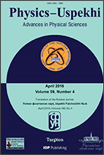
PHYSICS-USPEKHI
Connecting Researchers Through High-Impact SciencePHYSICS-USPEKHI, published by Uspekhi Fizicheskikh Nauk, is a prominent peer-reviewed journal in the field of physics and astronomy, reaching researchers and professionals since its inception in 1993. With an ISSN of 1063-7869 and an E-ISSN of 1468-4780, this esteemed journal has been classified as Q2 in the Physics and Astronomy category based on the 2023 quartiles, ranking 74 out of 243 journals in its Scopus classification, placing it in the 69th percentile. Although currently not an open access journal, it provides invaluable insights and advancements in the field, fostering an environment for scholarly exchange and collaborative research. Based in Moscow, Russia, PHYSICS-USPEKHI continues to shape the landscape of theoretical and experimental physics, inviting submissions that contribute to its rich legacy of high-impact scientific discourse.

Optics Continuum
Fostering Collaboration in the World of OpticsOptics Continuum, published by Optica Publishing Group, is a pioneering open access journal dedicated to advancing the field of optics and photonics. Since its inception in 2022, this journal seeks to provide a vital platform for the dissemination of groundbreaking research and innovative developments across several interconnected domains, including electrical and electronic engineering, atomic and molecular physics, and material sciences focused on electronic, optical, and magnetic materials. With impressive rankings in Scopus—placed #384 in Electrical and Electronic Engineering and #109 in Atomic and Molecular Physics—the journal aims to engage a diverse readership comprised of researchers, professionals, and students, promoting collaboration and knowledge exchange. The journal's open access model ensures that cutting-edge research is readily available to all, nurturing an inclusive academic environment. For those interested in staying at the forefront of optics research, Optics Continuum is an essential resource that continuously enriches the global scientific community.
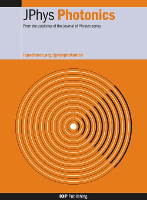
Journal of Physics-Photonics
Illuminating the Future of Photonics ResearchJournal of Physics-Photonics, published by IOP Publishing Ltd in the United Kingdom, is an esteemed Open Access journal that has been at the forefront of research in the field of photonics since its inception in 2018. With an impressive portfolio, the journal has achieved Q1 ranking in 2023 across multiple disciplines, including Atomic and Molecular Physics, Electrical and Electronic Engineering, and Electronic, Optical, and Magnetic Materials. This positions it among the leading journals in these areas, reflecting its significant influence and contribution to advancing knowledge and innovation. The journal aims to disseminate high-quality research findings that encompass a wide range of topics in photonics, promoting interdisciplinary approach that fosters collaboration among researchers, professionals, and students. With its commitment to open access, Journal of Physics-Photonics ensures that groundbreaking research is accessible to all, empowering a global audience to engage with and benefit from the latest advancements in photonic technologies.

Photonics
Pioneering Discoveries in Atomic and Molecular PhysicsPhotonics, an esteemed journal published by MDPI, is a leading platform for researchers in the fields of atomic and molecular physics, optics, and instrumentation. Since its inception in 2014, the journal has fostered open access to cutting-edge research, facilitating knowledge dissemination in these dynamic disciplines. With its Q2 ranking in the 2023 Scopus metrics for various categories, including radiology, nuclear medicine, and imaging, Photonics represents a crucial academic resource for professionals and students seeking to advance their understanding and expertise. Located in Basel, Switzerland, the journal plays a pivotal role in bridging theoretical and practical approaches to photonic technologies. Researchers are encouraged to contribute their findings, thereby enriching the journal’s impact and relevance in the global scientific community through collaboration and innovation.
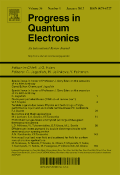
PROGRESS IN QUANTUM ELECTRONICS
Connecting Ideas in Quantum and Materials SciencePROGRESS IN QUANTUM ELECTRONICS, published by PERGAMON-ELSEVIER SCIENCE LTD, is a premier international journal that serves as a critical forum for the dissemination of high-quality research in the fields of atomic and molecular physics, electrical engineering, and materials science. With its esteemed Q1 category ranking in several disciplines, including Atomic and Molecular Physics, Electrical and Electronic Engineering, and Electronic, Optical and Magnetic Materials, this journal commands a high impact factor and is recognized for its rigorous peer-review process. Established in 1969 and evolving through various phases, the journal currently compiles cutting-edge research that drives advancements in quantum technologies. Researchers, professionals, and students alike are invited to explore a wealth of knowledge and stay updated on pioneering developments in quantum electronics, enhancing their understanding and contributing to the progression of this dynamic field.
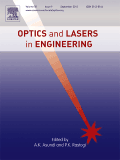
OPTICS AND LASERS IN ENGINEERING
Harnessing Light for Engineering ExcellenceOPTICS AND LASERS IN ENGINEERING, published by Elsevier Science Ltd, is a premier journal dedicated to advancing the field of optics and laser technology in engineering applications. With a robust ISSN of 0143-8166 and E-ISSN 1873-0302, this journal is positioned within the top quartile (Q1) across several categories, including Atomic and Molecular Physics, Electrical Engineering, and Mechanical Engineering as of 2023, showcasing its prestige and impact in the scientific community. The journal has consistently ranked high in Scopus, notably within the top 10% for Mechanical Engineering and Electronic, Optical, and Magnetic Materials research. Since its inception in 1980, OPTICS AND LASERS IN ENGINEERING has served as a vital platform for disseminating cutting-edge research, fostering innovation and collaboration among researchers, professionals, and academia. Though it does not currently offer Open Access options, its high impact factor and selective publication process ensure that articles reach a wide audience while maintaining rigorous academic standards. Researchers and students alike are encouraged to engage with this influential journal to contribute to and stay abreast of advancements in optical technologies and their engineering applications.
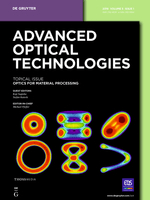
Advanced Optical Technologies
Pioneering Innovations in Light and MaterialsAdvanced Optical Technologies is a reputable journal dedicated to advancing the field of optics and photonics, published by FRONTIERS MEDIA SA in Switzerland. Since its inception in 2012, the journal has made significant contributions to the domains of Atomic and Molecular Physics, Electronic, Optical and Magnetic Materials, and Instrumentation, achieving commendable rankings within these categories, including a Q2 quartile classification in 2023. With an emphasis on open access, Advanced Optical Technologies aims to facilitate the rapid dissemination of research findings, thereby fostering collaboration and innovation among researchers, professionals, and students alike. The journal serves as an essential platform for cutting-edge research articles, reviews, and technical notes, and its commitment to quality is reflected in its robust Scopus rankings. As the field of optical technologies continues to expand, this journal plays a crucial role in highlighting pivotal advancements and promoting interdisciplinary dialogue among scholars in the scientific community.